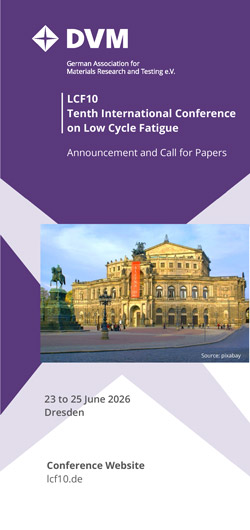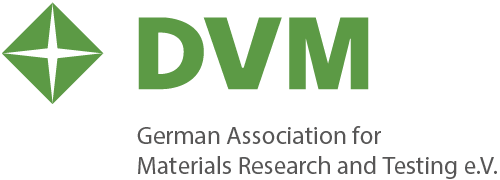Scope
Continuing the successful series of LCF conferences established in 1979, the Tenth International Conference on Low Cycle Fatigue (LCF-10) will be held in Dresden, Germany, from June 23 to 25, 2026. The permanent and even growing
interest of the scientific community in low-cycle fatigue, including thermomechanical fatigue addresses on the one
hand a broad range of applications, e.g. in energy technology, transportation, civil engineering, and several other
topics. On the other hand, many scientific questions on fundamental deformation and damage mechanisms,
influence of multiaxial stresses / strains, creep-fatigue and TMF/HCF interaction as well as crack initiation and growth
are investigated with increasing experimental and simulative efforts, as well as using data driven approaches.
As a bridge between fundamental research and application in component and structural design, simulation
approaches for cyclic plasticity, crack initiation and growth have made impressive and still continuing progress in the
recent decades: FEM-based deformation and life assessment models at different scales, from the microstructure to
macroscopic structures, are state-of-the art and under further successful development, especially for reliable design
of components undergoing complex isothermal and/or thermomechanical loadings. Current research activities show
that LCF research keeps being a hot topic in material research and in structural integrity considerations as well.
The development of virtual component and materials design is boosted by the current megatrend in digitization
imposing entirely new opportunities, but also challenges, in data storage according to the FAIR principle via
eLabBooks and repositories using metdata shemas and ontologies. Based on that, and novel high-througput
characterization, e.g. by automated image analyses and indentation testing, data driven approaches in fatigue
research, and design of fatigue resistant structures becomes increasingly viable. Linking 2D, and 3D full-field
deformation measurement via digital image correlation with high-fidelity, even multiscale FEM simulation are a further
hot topic in this context.
The objective of LCF10 is to provide a worldwide platform for scientific communication and discussion as well as a
point of origin for collaboration of scientists and engineers interested in fundamental aspects and practical
application as well as novel challenges in the context of digitalization.
Prof. Tilmann Beck
Rhineland-Palatinate Technical University (RPTU)
Kaiserslautern-Landau, Germany
Prof. Fabien Szmytka
ENSTA Institut Polytechnique de Paris
Paris, France


